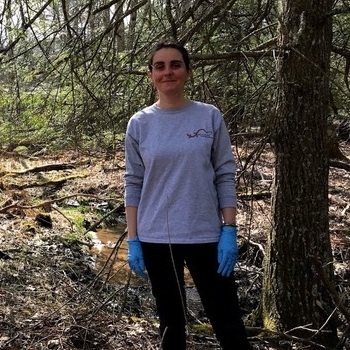The sweet tooth of mosquitoes: leveraging knowledge on sugar feeding for their control

Dr. Chloe Lahondere
October 9 at 12:20pm via Zoom
Chloé received her Master’s (2009) and PhD (2012) degrees from the University of Tours, France where she worked in Prof. Claudio Lazzari’s lab on thermal stress and thermoregulation processes in disease vector insects. She then moved to Seattle in 2013 to join Prof. Jeff Riffell’s lab in the Department of Biology at the University of Washington to study mosquito olfaction and thermal biology. In 2017, she joined the Department of Biochemistry at Virginia Tech as a Research Assistant Professor. She is also affiliated with the Global Change Center, Biotrans, the Department of Entomology and Center for Emerging, Zoonotic and Arthropod-borne Pathogens. In 2020, she transitioned to a tenure track position. Her lab focuses on studying the thermal biology, eco-physiology and neuro-ethology of disease vector insects and ticks. She relies on a collaborative, multidisciplinary and integrative approach, combining field work, behavioral analyses, molecular biology, chemical ecology and electrophysiology. The labs central goal is to get a better understanding of the disease vectors’ biology, to develop new tools to control their populations.
Mosquitoes, by transmitting pathogens (e.g., Plasmodium sp., Zika virus, West Nile virus) to humans and other animals, represent an important health and economic burden to communities worldwide, affecting millions of people each year. Despite substantial efforts to prevent the spread of insect-borne diseases, vaccines and treatments are not available for many of these diseases and rising insecticide resistance challenges current vector control plans. New strategies are, therefore, urgently needed to limit the transmission of these pathogens. To create efficient tools to reduce population, it is more critical than ever to have a better understanding of basic mosquito biology and ecology, of which some aspects have been historically overlooked, including sugar feeding behavior. While female mosquitoes need blood nutrients to produce their eggs, both females and males must consume sugar meals to obtain carbohydrates to survive. In this talk, I will highlight some of our recent efforts focusing on sugar feeding in both native and invasive disease vector mosquito species and how we can leverage this knowledge to develop new and efficient tools to control their populations.
This seminar has no suggested readings.
Flyer not yet available.
This seminar will be recorded on the Fralin YouTube channel.


